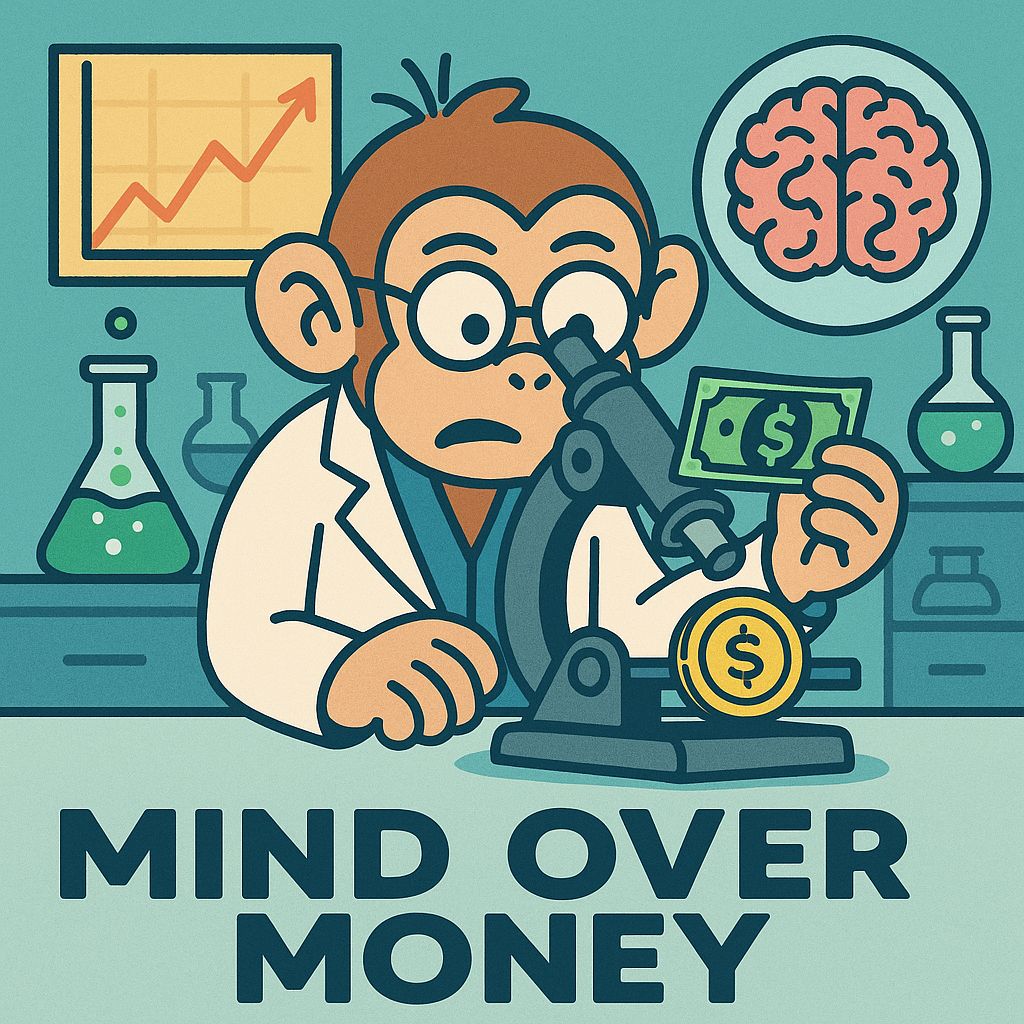- Luci Money Moves
- Posts
- Mind Over Money: Why You Buy Things You Don’t Need
Mind Over Money: Why You Buy Things You Don’t Need
How your brain tricks you into overspending—and how to outsmart it.

🔬 Welcome to the Experiment
Ever walk out of a store (or close a tab) with a bunch of stuff you definitely didn’t plan to buy? But somehow, some way, it made its way into your hands (or your cart)...
You’re not broken. You’re not reckless.
You’re human.
And your brain? It’s been quietly learning your spending habits for years—shaped by how you grew up, what you scroll past, and how good it feels to click “add to cart” after a trash day.
It’s like your own personal AI—trained on your vibe, your stress levels, your TikTok faves, and your midnight cravings.
Because let’s be real:
In your 20s, money isn’t just money.
It’s freedom. It’s fun. It’s a “treat yourself” after that 3-hour commute, your 6th rejection email, or a fridge that’s somehow full but has nothing to eat.
So today, we’re putting on the lab coats and thinking caps to look inward.
Let’s examine five common Spending Subjects—from chaotic to conscious—and study how we can evolve from 🧠 "buy now" brains to 🧠 "buy better" ones.

Find What Your Looking For Here
🧪Subject 001: The Feels-Fueled Finesser
Alias: The Retail Therapy Guru
Primary Trigger: Feelings → Purchase
Case Summary:
This subject shops with the heart, not the wallet. After a rough day, break-up, or existential spiral, nothing hits quite like a little checkout dopamine.
What starts as “I deserve something nice” often spirals into a dopamine-fueled spree that’s later followed by guilt or regret.
Psychology at Play:
Dopamine—the brain’s reward chemical—spikes when you anticipa`te a purchase. Emotional spending hijacks this reward loop. Your brain begins to view spending not as a financial decision, but as an emotional release.
Behavioral Symptoms:
“I earned this” purchases after bad days or burnout
Self-soothing with takeout, fast shipping, or little luxuries
Post-purchase guilt that’s quickly solved by…another purchase
Rewiring Protocol:
✔️ Build a “Feel-Better Toolkit” that doesn’t require money: a walk, playlist, stretch, journaling, texting a friend
✔️ Keep a “Treat Yourself Without Buying” list
✔️ Ask before every impulse buy:
→ Is this self-care or self-sabotage?
🧪 Subject 002: The Deal-Hunting Daydreamer
Alias: The Justification Jedi
Primary Trigger: Brain biases → Totally “logical” purchases
Case Summary:
This subject is easily hypnotized by psychological tricks—like sales, price comparisons, and TikToks whispering, “you need this”. They might recognize a poor value after the purchase, but in the moment, the decision feels rational… even smart.
Psychology at Play:
Anchoring: A $49.99 jacket looks “cheap” next to a $120 one, even if you don’t need either
Sunk Cost Fallacy: You keep unused subscriptions because “you’ve already paid.”
Temporal Discounting: Your brain values small rewards now more than big ones later
Instant Gratification: Present You wins; Future You suffers. Every. Time.
Behavioral Symptoms:
Buying something just because it’s on sale
Rationalizing random purchases as “investments”
Holding onto subscriptions “just in case”
Rewiring Protocol:
✔️ Practice “future me” framing: Will I still want this next week?
✔️ Make a 7-day wishlist buffer: delay the dopamine
✔️ Audit recurring charges quarterly—don’t let your money leak
✔️ Unsubscribe from promo emails, unfollow “treat” accounts, and uninstall shopping apps to cut the influence
🧪 Subject 003: The Scroll-Spender
Alias: The Tap-to-Buy Technician
Primary Trigger: Boredom → Auto-purchase mode
Case Summary:
This subject doesn’t mean to spend—it just… happens. They scroll, they tap, and next thing you know, a package is on the way. Oops. They’re not driven by emotion or logic—but by habit. Shopping is muscle memory now.
Psychology at Play:
Habits form when a cue leads to a routine that delivers a reward. The digital world has made buying frictionless, so your brain doesn’t even register it as a “decision.” It’s just what happens when you're bored, tired, or scrolling.
Behavioral Symptoms:
Midnight Amazon hauls you barely remember
“How did this get into my cart?”
Habits tied to apps, moods, or time of day
Rewiring Protocol:
✔️ Create purchase friction: remove saved cards, turn off 1-click
✔️ Install a pause ritual: journal the impulse before any buy
✔️ Replace cues: If boredom is the trigger, shift the habit to something else (stretch, scroll a different app, voice memo a thought)
🧪 Subject 004: The Debt Cycler
Alias: The Swipe-Swipe Surgeon (That Swipes All Their Problems Away)
Primary Trigger: Debt fatigue → “One more won’t hurt”
Case Summary:
This subject tends to already have accumulated debt—sometimes a little, sometimes a lot—and now operates under the motto of “what’s a little more?”
Rather than halt the pattern, the debt becomes a numb backdrop to continued spending. The Swiper knows the credit card statement is ugly, but convinces themselves they’ll handle it next month. Which then becomes… next month again.
Psychology at Play:
This is debt denial—when the emotional weight of debt gets so heavy and constant, your brain just…mutes it. Pair that with future discounting (“I’ll fix it later”) and learned helplessness (“It’s already bad, so what’s the point?”)—and you get a mindset that normalizes the chaos.
Behavioral Symptoms:
“I’ll deal with it next month” (every month)
Buying stuff even when you know it’s a bad idea
Not checking statements because… yikes
Normalizes debt as “just how it is” and keeps spending like the bill won’t come due
Rewiring Protocol:
✔️ Check your total debt weekly—even if it stings
✔️ Swap shame for structure: Set auto-payments (even tiny ones) to rebuild traction
✔️ Use visual progress: debt tracker, money app, printable chart (‘Cause who doesn’t love a fun, aesthetic chart?)
✔️ Try a “swiper no swiping” challenge: 5 days at a time, then reset
Debt isn’t forever—but avoidance makes it feel that way.
You’re not bad with money—you’re just overwhelmed by it.
Regaining control starts with one honest look and one small shift.
🧪 Subject 005: The Chill Baller
Alias: Buddha Billz (a.k.a. Zen with Cents)
Primary Trigger: Values → Vibes → Victory
Case Summary:
This is the final form (from what we have observed). They’re not perfect—but they spend with purpose. Every dollar is aligned with their priorities, their goals, and their future. Enlightenment? Practically.
Psychology at Play:
Budgeting isn’t a punishment—it’s peace. That “buy dopamine” hits way harder when you’ve waited, planned, and aligned the purchase with your priorities, unlike that pack of mystery TikTok gadgets already collecting dust.
Their spending is rooted in clarity—not emotion, ego, or impulse. They treat money as a tool, not a trigger. It’s not “Can I afford this?” It’s “Does this match who I want to be?”
Behavioral Symptoms:
Rarely regrets purchases
Spends on what matters (experiences, growth, impact)
Uses budgeting to enable life, not restrict it
Rewiring Protocol (How They Got Here):
✔️ Built awareness of their spending defaults
✔️ Connected purchases to their core values
✔️ Created systems that reward consistency + progress, NOT perfection
Important Note:
Buddha Billz wasn’t born this way.
They trained. And you, too, can become enlightened in your spending.
💬 Results Inconclusive (But Progress is Progressing)
At the end of the day, we’re all human. Some days you’re the Tapper. Sometimes the Feel-Fueled Finesser. The goal isn’t to be perfect. It’s to notice what’s happening—and catch yourself before it’s too late. As long as you’re the intentional spender most of the time, you’re doing great. Spending consciously doesn’t mean saying “no” to fun. So next time you feel the itch: Pause. Then rerun the experiment with a better outcome. Let’s keep testing, |  |
Want to outsmart your spending habits for real?
We help you find credit cards that work based on your spending and reward you.

Reply